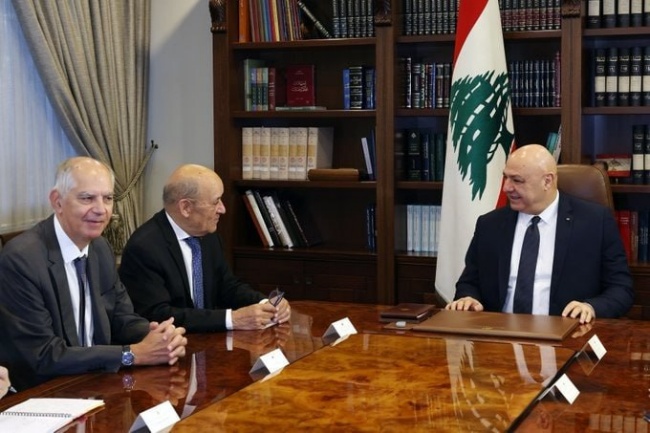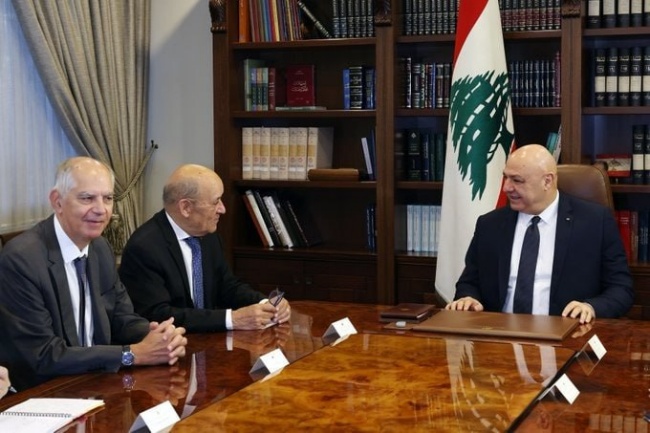 Aoun and Le Drian (Lebanese presidency X account, September 11, 2025)
Aoun and Le Drian (Lebanese presidency X account, September 11, 2025)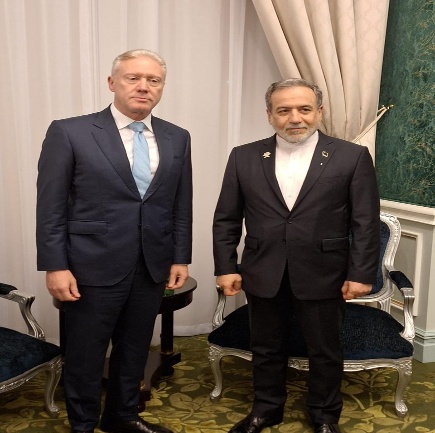 Rajji (left) and Araghchi (Lebanese foreign ministry X account, September 14, 2025)
Rajji (left) and Araghchi (Lebanese foreign ministry X account, September 14, 2025)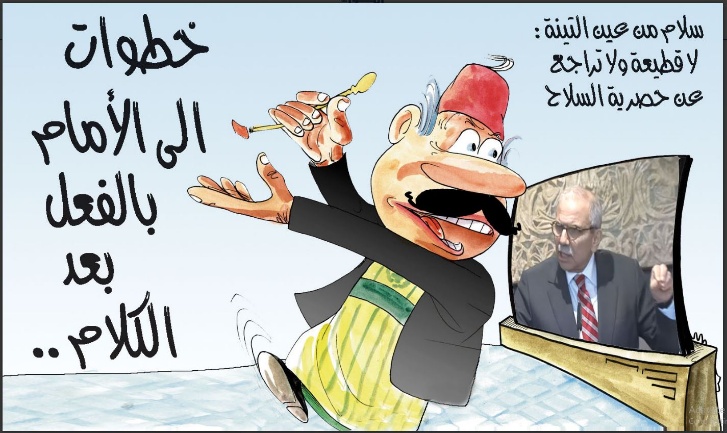 Salam: “There is no return from [a state] monopoly on weapons.” “Now there is action after all the talk (al-Liwaa, September 10, 2025).
Salam: “There is no return from [a state] monopoly on weapons.” “Now there is action after all the talk (al-Liwaa, September 10, 2025).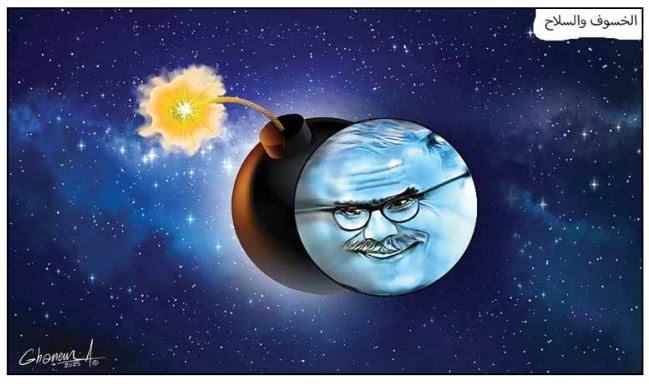 Lunar eclipse and the issue of weapons (al-Joumhouria, September 8, 2025)
Lunar eclipse and the issue of weapons (al-Joumhouria, September 8, 2025)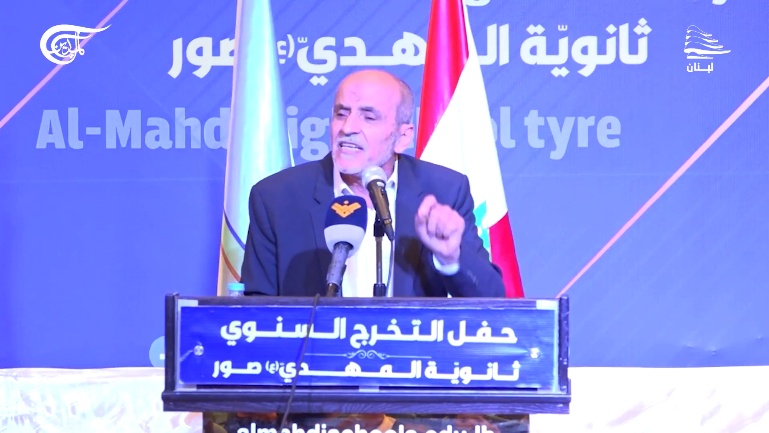 Hassan Hashi (al-Nashra, September 14, 2025
Hassan Hashi (al-Nashra, September 14, 2025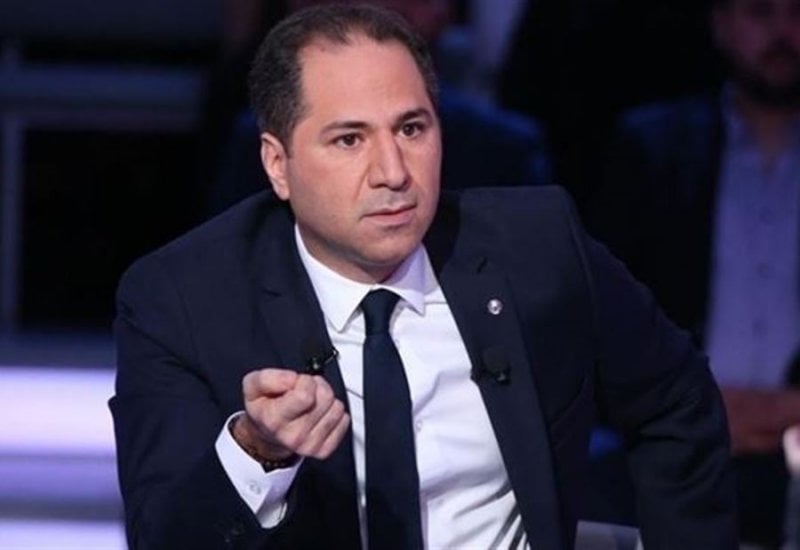 Sami Gemayel (Lebanon Debate, February 10, 2025)
Sami Gemayel (Lebanon Debate, February 10, 2025)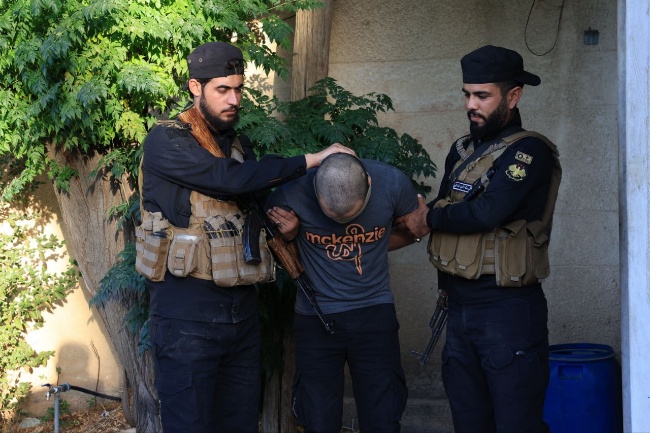 Syrian interior ministry personnel arrest a cell identified with Hezbollah (Syrian ministry of the interior Telegram channel, September 11, 2025)
Syrian interior ministry personnel arrest a cell identified with Hezbollah (Syrian ministry of the interior Telegram channel, September 11, 2025)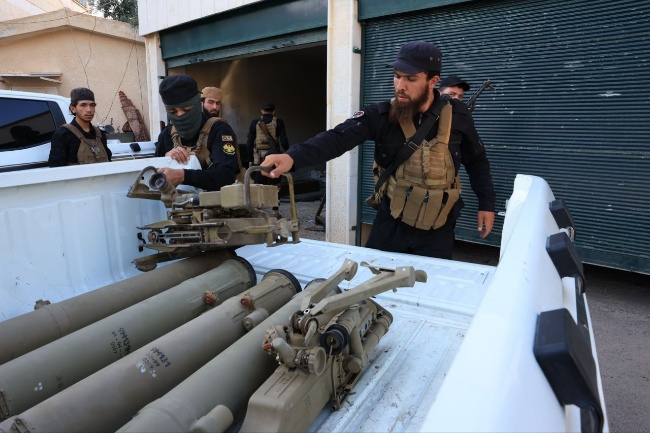 Syrian interior ministry personnel arrest a cell identified with Hezbollah (Syrian ministry of the interior Telegram channel, September 11, 2025)
Syrian interior ministry personnel arrest a cell identified with Hezbollah (Syrian ministry of the interior Telegram channel, September 11, 2025)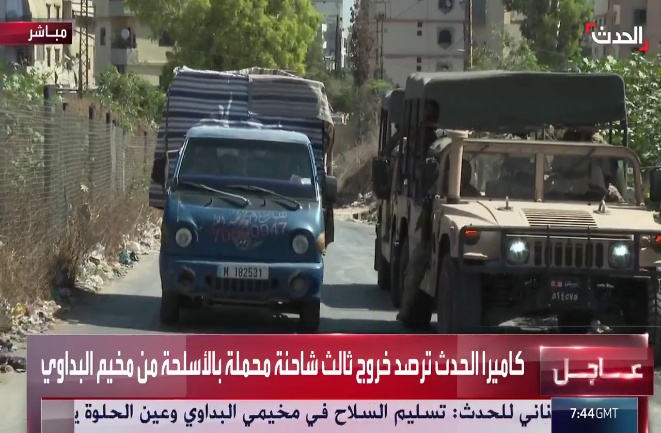 A truck with weapons leaving the al-Badawi refugee camp in northern Lebanon (al-Hadath, September 13, 2025).
A truck with weapons leaving the al-Badawi refugee camp in northern Lebanon (al-Hadath, September 13, 2025).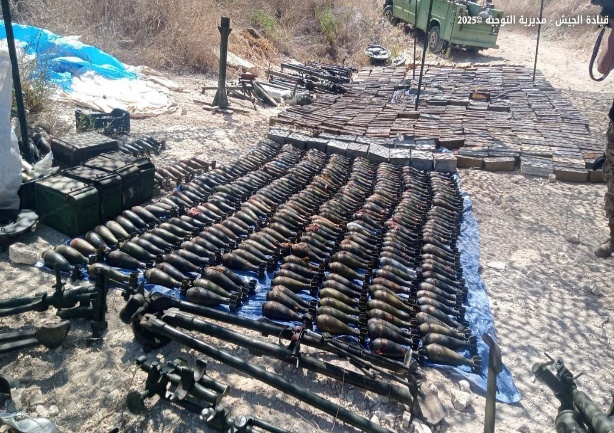 Ammunition handed over to Lebanese army forces (Lebanese army X account, September 13, 2025)
Ammunition handed over to Lebanese army forces (Lebanese army X account, September 13, 2025)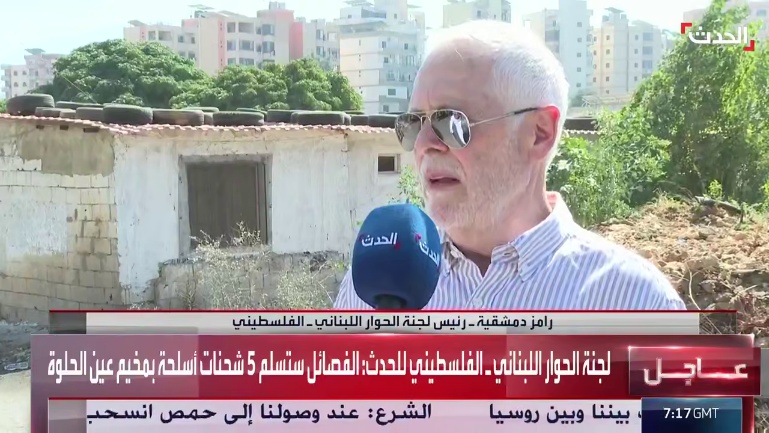 Ramez Dimechkie (al-Hadath, September 13, 2025)Overview[1]
Ramez Dimechkie (al-Hadath, September 13, 2025)Overview[1]
IDF forces attacked Hezbollah infrastructure and eliminated operatives of the organization as part of ongoing operations against Hezbollah’s presence in south Lebanon, which violates the ceasefire agreement understandings, and against Hezbollah’s efforts to increase its military-terrorist capabilities and restore its arsenal. They attacked elite Radwan Unit training camps in the Beqa’a Valley in northeastern Lebanon and eliminated at least eight Hezbollah terrorist operatives, including one who also belonged to the Imam Hussein Division of the Iranian Qods Force.
Lebanese President of Lebanon Joseph Aoun met with the French envoy and called for international pressure to be exerted on Israel to stop its attacks in Lebanon.
Na’im Qassem, Hezbollah secretary general, opposed the Lebanese government’s plan for a state monopoly on weapons and called on the government to realize its sovereignty, fight corruption and reorganize the state. Other Hezbollah figures said the organization was not prepared to give up its weapons and claimed the government discussions on disarmament were contrary to the National Pact. The United States approved an aid package of $14.2 million to assist the Lebanese army in implementing the monopoly on weapons.
The authorities in Syria foiled more than ten attempts to smuggle weapons from Syria to Lebanon within the past two months.
The Lebanese army continued to disarm the PLO and Fatah, and for the first time removed weapons from the Ain al-Hilweh refugee camp in Sidon, one of the most complex in the country, and from the al-Badawi camp in northern Lebanon. According to reports, the Lebanese authorities were continuing talks with Hamas representatives to persuade them to hand over their weapons.
The Ceasefire
The IDF
IDF forces attacked Hezbollah infrastructure and eliminated operatives of the organization as part of ongoing operations against Hezbollah’s presence south of the Litani River, which violates the November 27, 2024 ceasefire agreement understandings, and against Hezbollah’s efforts to increase its military-terrorist capabilities and restore its arsenal. The forces attacked Hezbollah military-terrorist camps where its operatives underwent training, including an elite Radwan Force camp in the al-Hermel area in the northern Beqa’a Valley. Three Hezbollah operatives were eliminated, one of whom also belonged to the Imam Hussein Division of the Iranian Qods Force (IDF spokesperson, September 8-15, 2025). The Lebanese ministry of health reported eight killed and 12 wounded in the Israeli attacks (al-Nashra, September 8-15, 2025).
Hezbollah
Na’im Qassem, Hezbollah secretary general, gave a speech for the Prophet Muhammad’s birthday in which he reiterated his opposition to the government’s plan for a state monopoly on weapons and called for the issue to be abandoned since it served Israel. Regarding the ceasefire agreement with Israel, he claimed that the agreement had not achieved its purpose and that Israel’s “violations” continued. He said the United States had retreated from its commitment to Lebanon and demanded Hezbollah disarm before any further step, adding that the West had no genuine interest in strengthening or rebuilding Lebanon. He claimed the goal of the United States and Israel was to weaken Lebanon, and therefore Lebanon had to realize its sovereignty without external involvement, expel Israel, fight corruption and reorganize the state (al-Manar, September 10, 2025).
Sheikh Ahmed Qabalan, Lebanon’s senior Shi’ite mufti, delivered a Friday sermon in which he opposed “Israeli aggression” in Lebanon and called for unity between the “resistance”[2] and the Lebanese army, and for Lebanese to stand together against Israel’s aggression and its “expansionist” ambitions (Nidaa al-Watan, September 12, 2025).
Sayyid Ali Fadlallah, a senior Shi’ite cleric, delivered a Friday sermon in which he called for the Lebanese people to realize their sovereignty over the land, overcome the challenges facing them and not rely on “external elements” (al-Alam, September 12, 2025).
The Lebanese Government
Lebanese President Joseph Aoun met with French envoy Jean-Yves Le Drian and called for pressure to be exerted on Israel to stop its attacks in Lebanon, which he said would help the government’s plan to disarm Hezbollah (al-Nashra, September 11, 2025).
Nabih Berri, speaker of the Lebanese Parliament, met with Hamid Reza Haji Babaei, the deputy speaker of Iran’s Islamic Consultative Assembly, to discuss the situation in Lebanon and bilateral relations. Berri condemned Israel’s “ongoing occupation” of Lebanese territory and praised Iran for its support of Lebanon and the “resistance.” Berri claimed Lebanon adhered to the ceasefire, but Israel repeatedly “violated” it and refused to withdraw its forces from south Lebanon. Babaei said Berri and the Amal movement were to be praised for their conduct during a sensitive period and for promoting “Shi’ite unity.” He also criticized American foreign policy, which he claimed was prepared to endanger regional security for the sake of Israel. Berri called for continued parliamentary cooperation between Iran and Lebanon “to deal with common threats” (IRNA, September 11, 2025).
Lebanese Prime Minister Nawaf Salam condemned the visit of the Avichay Adraee, IDF spokesperson in Arabic, in south Lebanon and claimed the visit showcased Israel’s “aggression” and its harm to Lebanon’s stability. Salam called on the international community to exert pressure on Israel so that it would withdraw from Lebanon and stop its attacks (Lebanese prime minister’s office X account, September 11, 2025).
Lebanese Interior Minister Ahmed al-Hajjar reported that in recent weeks the ministry’s intelligence division had carried out several security operations, and people suspected of involvement in terrorist and criminal activity were arrested. He claimed there were also collaborators with Israel among the detainees. He added that he received ongoing updates on the work of the intelligence division and on the arrests, adding that the division was acting to safeguard the security of the state (MTV, September 15, 2025).
Disarming Hezbollah[3]
After the Lebanese government approved the weapons limitation plan presented by the army commander, government officials continued to push for its implementation, alongside contacts with the international community which had backed the decision and supported the government. Hezbollah and others in the Shi’ite camp sharply criticized the government’s decision and claimed that the government preferred disarmament to the security of the Lebanese people.
The Lebanese Government
After meeting with Nabih Berri, speaker of the Lebanese Parliament, Lebanese Prime Minister Nawaf Salam said that the government was committed to disarmament and the army’s plan would be monitored monthly. He added that the army needed additional equipment and money due to the burden of its missions (al-Nashra, September 9, 2025).
Lebanese Foreign Minister Yousef Rajji said that according to the plan the Lebanese army would disarm Hezbollah south of the Litani River within three months. He said it was the first phase of five which the army commander had presented to the government (Agence France-Presse, September 9, 2025).
Lebanese President Joseph Aoun spoke with French envoy Jean-Yves Le Drian, regarding the state monopoly on weapons. Le Drian said he supported Lebanon and steps to strengthen the state, such as convening international conferences to discuss reconstruction and aid for the army and the economy. He said he had also discussed the issue of aid to Lebanon with Saudi Arabia, noting that the recent steps taken by the Lebanese government were positive and would help increase the amount of aid (Lebanese presidency X account, September 11, 2025). Meeting with Le Drian, Lebanese Prime Minister Nawaf Salam said that limiting weapons in Lebanon was at the top of the country’s priorities, along with reconstruction, support for the army and economic recovery, and French and other support was required (al-Nashra, September 11, 2025).

Aoun and Le Drian (Lebanese presidency X account, September 11, 2025)
“Political sources in Lebanon” reported that Hezbollah’s disarmament was one of the central, sensitive issues in Le Drian’s visit, who emphasized that any military or economic aid to Lebanon was conditional on the progress of the Lebanese army’s plan for limiting weapons’ possession. The “sources” also reported that France felt the Lebanese army was a national institution capable of uniting society and gaining external support, including investments in the country. According to the “sources,” Hezbollah saw the policy of state monopoly on weapons as a direct threat and a Western initiative to reshape the balance of power in Lebanon (Aram News, September 12, 2025).
On the sidelines of the Arab-Islamic emergency summit in Qatar, Lebanese Foreign Minister Yousef Rajji met with Iranian Foreign Minister Abbas Araghchi to discuss the situation in Lebanon and the region. Rajji discussed the Lebanese government decision regarding its monopoly on weapons and to extend state sovereignty over all Lebanese territory, while Araghchi reiterated his country’s position respecting Lebanon’s sovereignty (Lebanese foreign ministry X account, September 14, 2025).

Rajji (left) and Araghchi (Lebanese foreign ministry X account, September 14, 2025)

![Salam: "There is no return from [a state] monopoly on weapons." "Now there is action after all the talk (al-Liwaa, September 10, 2025).](https://www.newsbeep.com/wp-content/uploads/2025/09/word-image-1758017293587.jpeg)
Right: Salam: “There is no return from [a state] monopoly on weapons.” “Now there is action
after all the talk (al-Liwaa, September 10, 2025). Left: Lunar eclipse and the issue of weapons (al-Joumhouria, September 8, 2025)
“Knowledgeable political sources” reported that the part of the Lebanese army plan approved by the Lebanese government regarding south Lebanon was being implemented de facto, including the army’s takeover of the area south of the Litani River. According to the sources, Hezbollah was prepared to cooperate at this stage, and Israel also wanted to implement the plan in south Lebanon. However, there was concern that Israel would settle for what was achieved south of the Litani River or north of it up to the Awali River at most, but would not stop its daily counterterrorism activity and raids, on the grounds that the north of the country had not been disarmed. According to the report, such a situation was dangerous for Lebanon (al-Joumhouria, September 10, 2025).
The Lebanese Army
The United States approved an aid package to Lebanon estimated at $14.2 million to reconstruct the Lebanese army’s capabilities to disarm the non-army groups in Lebanon which, including Hezbollah. The aid would make it possible for the Lebanese army to patrol, dismantle caches of weapons and military equipment, and handle weapons. The aid was given as part of support for the ceasefire agreement between Israel and Lebanon from November 2024 (United States Department of War website, September 11, 2025).
Hezbollah and Its Supporters
Na’im Qassem, Hezbollah secretary general, called on the Lebanese government to stop talking about disarmament because it would not affect Israeli activity in Lebanon. He said the decision to disarm was contrary to the National Pact and the existing mechanism was intended only to provide information as to where the organization’s weapons were located (al-Manar, September 10, 2025).
Mohammed Raad, head of the Hezbollah faction in the Lebanese Parliament, said preference should be given to decisions which benefitted Lebanon, preserved its sovereignty and dealt with internal challenges without external influence from Israel and the United States. He claimed there were groups in Lebanon exploiting regional events and international support for political advantage. In his opinion the “resistance” had not been defeated on the battlefield but had chosen to stop fighting. He added that the Lebanese government’s decision contradicted national responsibility by not taking into consideration four decades of “resistance activity” and its contribution to the state’s deterrent capability. He said Hezbollah restrained itself because it was strong and preferred to fight the enemy rather than accept decisions resulting from external pressure, and therefore the weapons in Hezbollah’s hands were more legitimate than the government [sic] (al-Nour, September 8, 2025).
Hussein al-Hajj Hassan, a member of the Hezbollah faction in the Lebanese Parliament, said the weapons represented the organization’s “honor” and would not be relinquished. However, he said weapons could be discussed as part of a “national defense strategy,” in which all elements should participate (Lebanon Debate, September 8, 2025).
Hassan Izz al-Din, a member of the Hezbollah faction in the Lebanese Parliament, criticized the Lebanese government and claimed that disarming Hezbollah would damage the security of the Lebanese people and their ability to defend their sovereignty. He claimed that Israel wanted to disarm Hezbollah in order to destroy Lebanon’s “defense capability” and make it possible “to invade” the country again (al-Akhbar, al-Manar, September 13, 2025).
Hassan Hashi, a member of the Hezbollah faction in the Lebanese Parliament, criticized the Lebanese government and claimed the Lebanese army was not capable of defending Lebanon from an external threat and ensuring its sovereignty. He said Hezbollah would hand over its weapons “only to a strong state capable of defending itself.” Therefore, no one could demand they abandon the “resistance” and hand over their weapons (al-Nashra, September 14, 2025).

Hassan Hashi (al-Nashra, September 14, 2025
Ali Hijazi, secretary general of the Ba’ath Party in Lebanon, said it was not true that they were not prepared to take part in the security dialogue, but disarmament was “an insult to their honor” and all the guarantees offered were worthless, their weapons were what enabled them to confront Israel. He added that the “resistance” was not a “Shi’ite-only project” but a national project defending the state and its citizens (al-‘Ahed, September 15, 2025).
Hezbollah’s Opponents
Sami Gemayel, leader of the Phalange Party in the Lebanese Parliament, said Hezbollah’s secretary general had shown he was either in denial or detached from reality. He said the era of sectarianism in Lebanon had ended and they aspired to the country’s (Sami Gemayel’s X account, September 10, 2025).

Sami Gemayel (Lebanon Debate, February 10, 2025)
Amid Rakan Nazar Abd al-Qader, a journalist for al-Liwaa, wrote that with Iranian support, Hezbollah’s leadership refused to recognize the new post-war political situation, adding that Hezbollah had lost part of its previous support from the Shi’ite community. However, he said Hezbollah still had Shi’ite supporters but some of them might change their minds if Israel’s military pressure continued and there were difficulties in reconstructing Lebanon (al-Liwaa, September 10, 2025).
Challenges for Hezbollah
Difficulties in Smuggling Weapons from Syria to Lebanon
“A source in the Syrian ministry of the interior” reported that the Syrian authorities had foiled more than ten attempts to smuggle weapons from Syria to Lebanon within the past two months. The “source” added that Hezbollah was trying to collect part of its weapons stockpile in Syria and of the Iranian militias which had fought alongside the Assad regime, adding that a large part remained hidden in warehouses and secret stockpiles across Syria; Grad rockets, anti-tank missiles and light weapons were reportedly seized. “Political sources in Lebanon” reported that Hezbollah faced challenges including its proposed disarmament and pressures from Israel and the United States, and therefore it was trying to obtain weapons through the border area in the mountainous Homs and Qalamoun region, which was difficult to control (Aram News, September 8, 2025).
“Sources in the Syrian ministry of the interior” reported that a Hezbollah cell was arrested in the western suburbs of Damascus. The cell had reportedly trained in Lebanon and planned to attack in Syria, and had 19 Grad rockets, which were seized (al-Hadath, September 11, 2025). Hezbollah denied the Syrian accusations, claiming it had no presence in Syria and was meticulous regarding Syria’s stability and security (Radio al-Nour, September 11, 2025).


Syrian interior ministry personnel arrest a cell identified with Hezbollah
(Syrian ministry of the interior Telegram channel, September 11, 2025)
The Palestinians in Lebanon
Collecting Weapons from the Palestinian Terrorist Organizations[5]
This past week weapons continued to be collected from the Palestinian refugee camps, especially medium and heavy weapons. On September 13, 2025, Lebanese army forces entered the al-Badawi camp in northern Lebanon and the Ain al-Hilweh camp in Sidon. Abd al-Hadi al-Asadi, head of communications in the Palestinian National Security Forces in Lebanon, announced that the handover of Palestinian weapons from the PLO “factions”[6] to the Lebanese army had been completed. He said five truckloads of weapons were transferred from Ain al-Hilweh and three truckloads from al-Badawi (Lebanese News Agency, September 13, 2025). He added that the Palestinian camps were “now weapon-free” and the collection had been “smooth” thanks to prior coordination. He added that they would continue collecting, including weapons from Hamas, and expected to finish by the end of September 2025 (al-Hadath, September 13, 2025).
The Ain al-Hilweh refugee camp is considered one of the most dangerous in Lebanon and one of the most complex from which to collect weapons since control of its streets is divided among different terrorist organizations, some of them opposed to the PLO such as Hamas, as well as extremist factions belonging to Salafi jihadist organizations. “A Palestinian source inside the camp” noted that the operation was carried out secretly to prevent problems. He reported that camp residents were divided into two groups, one which supported handing over heavy weapons and continuing to hold light weapons, and one which refused to hand over any type of weapon. “Palestinian sources” noted that the videos distributed on social networks showed small trucks with their loads covered, allegedly transporting weapons from Ain al-Hilweh to Lebanese army bases. Meanwhile, “sources in Hamas” reported that a meeting would be held in the coming days with the Dialogue Committee to discuss the handover of weapons and other issues. According to the report, Hamas was holding meetings with Islamist forces in Ain al-Hilweh in an effort to unify their positions on the issue (al-Sharq al-Awsat, September 13, 2025).


Right: A truck with weapons leaving the al-Badawi refugee camp in northern Lebanon (al-Hadath, September 13, 2025). Left: Ammunition handed over to Lebanese army forces (Lebanese army X account, September 13, 2025)
Ambassador Ramez Dimechkie, head of the Lebanese-Palestinian Dialogue Committee, held a series of meetings with several Palestinian terrorist organizations, including Hamas and the Palestinian Islamic Jihad, to monitor the situation in the camps and discuss the issue of handing over Palestinian weapons. He reiterated the general intention of the Lebanese state to extend its sovereignty over all its territories in accordance with the constitution and international resolutions. He added that the Lebanese state was determined to move forward in solving the weapons problem in all the camps and among all the organizations without exception, and take more than one step to communicate with the organizations and push them to hand over their weapons as part of its policy, which also included Hezbollah’s weapons (al-Hadath, September 13, 2025).

Ramez Dimechkie (al-Hadath, September 13, 2025)
The Palestinian terrorist organizations, including Hamas, said they had no problem conducting an open dialogue with the Lebanese government through official meetings, which could be held in the near future. They responded positively to the extension of the authority of the Lebanese state over all its territories, but the weapons’ issue could not be isolated from their priorities, which included ensuring the rights of the Palestinian people, the security of the camps and the status of UNRWA, provided that there would be a unified, joint Palestinian decision on that issue as well (al-Araby al-Jadeed, September 12, 2025).
According to “a source in the Lebanese-Palestinian Dialogue Committee,” the Palestinians would continue to hand over their weapons despite those who doubted and gambled on its cessation. According to “the source,” it was a serious choice on both sides, Lebanese and Palestinian, especially since the PLO had taken action, made the strategic decision to hand over weapons and initiated the process, reorganized the refugee camps and reshaped their political, military and security leadership bodies, for the first time since 1984. He added that the security of the camps and the ability to control them internally and prevent their disintegration was at a top Lebanese priority and it was being handled carefully. Regarding the weapons belonging to Hamas and the Palestinian Islamic Jihad, meetings between head of the Dialogue Committee Dimechkie and Hamas representatives were continuing and were “positive.” Hamas claimed that it was subject to Lebanese law and did not possess heavy weapons. It was further reported that that aspect of the weapons handover was more complex, and that Dimechkie told Hamas that it had to cooperate with the Lebanese government as part of the extension of Lebanese sovereignty over all Lebanese territory, including the refugee camps (al-Anbaa, September 13, 2025).
[1] Click https://www.terrorism-info.org.il/en to subscribe and receive the ITIC’s daily updates as well as its other publications.
[2] Hezbollah and the Palestinian terrorist organizations operating in Lebanon.
[3] For further information, see the August 2025 ITIC report, Lebanese Government Decides to Disarm Hezbollah – Positions of Power Actors
[4] Anti-Israel terrorism and violence.
[5] For further information, see the May 2025 ITIC report, Disarming the Palestinian Factions in Lebanon, and the June 2025 report, The Armed Palestinian Terrorist Organizations in Lebanon.
[6] Terrorist organizations.
Related Articles

